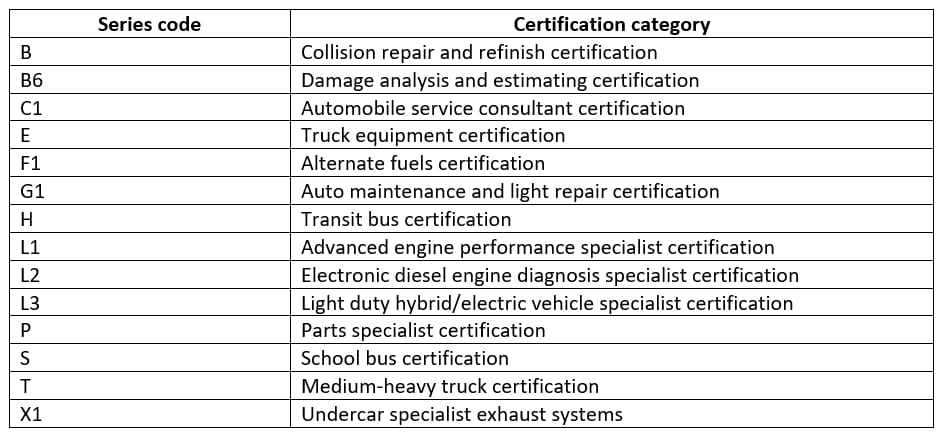Have you ever wondered how long it takes to become a mechanic? If you’re interested in a career in the field, it’s important to get familiar with some of its basic requirements. They include:
- A valid driver’s license to pass the required tests.
- Good manual dexterity and hand-eye coordination.
- An interest in mechanics and the willingness to learn new concepts.
- The ability to work independently along with a strong work ethic.
An understanding of math and science, good problem-solving skills, and sound mechanical reasoning will also help provide an edge over your competition.
A mechanic may spend anywhere between two to four years studying and obtaining the expertise and education needed for success. Often, employers expect mechanics to acquire certification from The National Institute for Automotive Service Excellence (ASE).
Once you have the basics down, you will need to find an apprenticeship or training program to teach you the skills required to work as a mechanic. According to the Bureau of Labor Statistics (BLS), the median yearly wage for automotive service mechanics and technicians hovers just over $44,000 as of 2020.
START YOUR AUTOMOTIVE CAREER
Earn your degree in Automotive Technology from NEIT and begin your new career path today!
ASSOCIATE'S DEGREE
BACHELOR'S DEGREE
This article will provide all the information on becoming an automobile mechanic, including certificate programs, salary prospects, and skill requirements.
Table of Contents
A Day in the Life of a Mechanic
Mechanics diagnose, troubleshoot, and fix problems with vehicles. Depending on their job training and specialization, they may work on different parts of a vehicle, such as transmission, electronics, braking, or engine. Everyday responsibilities of a mechanic include:
- Working with diagnostic equipment to identify mechanical and electrical problems
- Conducting routine maintenance, including lubricating parts and changing the fluid
- Evaluating the safety status of the vehicle
- Providing accurate estimates for repairs or maintenance jobs
- Responding to customers’ queries
- Maintaining records for future reference
- Maintaining all tools and machines in good working condition
Steps to Becoming an Auto Mechanic – How Long Does It Take?
The path to becoming a mechanic depends on the automotive technology program and what you choose. Becoming a mechanic takes time, dedication, and a lot of hard work. However, it is possible to become a skilled mechanic with some effort and perseverance.
The Basics
Mechanics need a high school diploma or GED to get into an auto mechanics school. They can enroll in an automotive vocational training program or other high school vocational programs.
Some mechanics begin working in trainee positions right after a high school diploma; others will spend one or two years in post-school training. It can take two to five years for an automotive technician to gain the necessary skills for success. They can also choose a certificate or associate degree to further their career.
Certifications and Degree Programs
Associate degree programs in automotive technology provide an in-depth understanding of automotive repair, including specific techniques and procedures. Potential career opportunities include automotive technician, glass repairer, distribution manager, and shop foreman.
Employers expect the automotive service technician to have at least one certification exam from the ASE. ASE certified mechanics possess technical skills in diverse specialty areas, like advanced engine performance, light repair and maintenance, collision repair, and damage cost analysis and estimation.
The ASE certification exams include nine A-series certificates. Each exam consists of 40-75 multiple choice questions that focus solely on topics like:
- Automatic transmission/transaxle
- Engine repair
- Brakes
- Heating and air conditioning
- Suspension and steering
- Light vehicle diesel engines
- Engine performance
- Manual drivetrain and axles
- Electrical/ electronic systems
Before the ASE certification exam, auto mechanics need at least two years of experience in automotive repair and other automotive systems. Related education also serves as on-the-job training for automotive technicians.
According to the BLS, the top 10-percent auto mechanics can earn as much as $71,940 annually.
Some companies have automotive technology training programs and industry certifications specific to their vehicle brands. A mechanic who wants to work with a certain company must complete the manufacturer training course and relevant certification exams. The training includes:
- Classroom instruction
- Internet-based modules
- Hands-on training in a repair shop
- Work internships
- Practical projects
There are fewer mechanics with manufacturer certifications than general mechanics. These individuals remain high in demand across car dealerships, workshops, and at the manufacturer organization itself. Companies are ready to pay high wages for brand-specific expertise.
Becoming a Master Mechanic
Once you pass all the A-series tests, the ASE recognizes you as a master technician. You can also become a master technician by clearing all exams in a particular series. Here’s a list of certification categories with series codes:

What Skill Do Mechanics Need?

Apart from the evident technical knowledge, prospective auto mechanics need the following skills to be successful in the industry:
Communication
Mechanics need to understand and convey technical issues, repairs, and estimates to their customers. Customers may ask for the repair options and best alternatives in their budget. This requires good communication skills.
Problem-Solving Ability
Mechanics need good diagnostic and problem-solving skills to determine what problems a vehicle is experiencing. This requires baseline knowledge of the brand and its components and associated technical expertise.
Attention to Detail
Auto mechanics must possess a keen eye for detail to keep the cars running smoothly. Today’s automobiles have complex systems and devices, all of which should operate efficiently to ensure the passengers’ safety.With the advent of new and more sophisticated automobile technology, the level of precision and accuracy demanded from mechanics has increased exponentially.
Work Organization
Mechanics work on multiple projects simultaneously. They need the skills to remain organized and document repairs for future reference.
Physical Strength
Automobile repair jobs require mechanics to stand, squat, bend, and twist in confined spaces. They need to handle light to medium weight tools. This requires sufficient physical stamina.
Administrative Skills
Mechanics need sufficient administrative skills to book appointments, track tools, deliver deliveries, and answer calls.
Proficiency With Diagnostic and Repair Tools
An in-depth understanding of tools and machines is necessary to work confidently and quickly on the shop floor. Automobile deliveries must abide by a strict timeline. Knowing exactly what tools are needed to complete repairs will help you avoid major delays.
How Do I Know If I Want to Become a Mechanic?
If you’re considering a career as a mechanic, it’s essential to ask yourself some key questions. If you enjoy solving problems and working with your hands, a career as a mechanic may be right for you. Listed below are a few questions that will help you decide:
- Are you interested in technology and electronics?
- Do new design developments in the automotive industry excite you?
- Do you like working with hands and tools?
- Do you prefer jobs that involve off-the-desk active labor?
- Are you interested in fixing things?
- Do you enjoy working on machines?
- Are you mechanically inclined?
Mechanic careers can include working in auto repair, minor engine repair, or heavy equipment repair. Auto technician jobs require a high level of technical skill and knowledge.
Advantages of Enrolling in Automotive Technology Training Programs

In the old days, cars were purely mechanical, and mechanics were mostly self-taught. As the automotive industry has evolved, so too have the tools and techniques used by service technicians.
As various automotive systems run on computer systems technology, formal automotive training plays a crucial role in long-term success. The best mechanics need to know about combustion engines, EV power trains, ECUs, transmissions, fuel systems, modern alternative fuel, and gearboxes.
Some workshops and companies may be willing to hire you as a novice, train you as an apprentice, and fund the certification exams. Though, this scenario may be hard to come by, especially when the employer has no assurance of ROI.
Here are some of the benefits of enrolling in an automotive technology program:
- You’ll develop an understanding of the basic principles of the internal combustion engine, brakes, electrical systems, and tools for auto maintenance.
- Formal training will familiarize you with the modern, sophisticated technology the vehicles run on.
- Earning a college degree shows that you have put in the effort and are serious about your career. This increases the confidence of career services and potential employers.
- Prospective auto mechanics should continue to work on their communication skills during their college degrees. This helps if you want to open a business or apply for a managerial position.
- Networking opportunities with industry professionals and experienced mechanics present the best options, and you discover the niches in high demand.
- Automotive schools give you access to a well-equipped auto tech lab for the best learning. Access all the resources to practice on engines and vehicles.
Today, automotive technology professionals are high in demand. Companies are eager to provide rewarding career opportunities in exchange for automotive service excellence.
Prospective mechanics can greatly benefit from automotive technology programs like the associate degree program at the New England Institute of Technology. Graduates will enjoy a wide array of opportunities in the auto repair industry along with best-in-class salaries.
START YOUR AUTOMOTIVE CAREER
Earn your degree in Automotive Technology from NEIT and begin your new career path today!
ASSOCIATE'S DEGREE
BACHELOR'S DEGREE
FAQs
What Are Some Tools Commonly Used by an Automotive Mechanic?
Standard tools mechanics work with include wrenches, sockets, and ratchets. Other power tools include pneumatic wrenches, welding torches, hoists, and jacks. Vehicle systems with modern ECUs need knowledge of computers and manufacturers’ software for performing updates.
Is Working as an Automotive Mechanic Safe?
Automotive engineers face the risk of cuts, burns, and bruises on the job, but formal automotive technology training prepares them for the necessary precautions while working.
What Is a Typical Work Week for an Automotive Mechanic?
It is common for auto mechanics to work full-time and even on the weekends. Cars can break down anytime, and customers may need emergency services.
What Are the Key Aspects of Automotive Service Excellence?
Service excellence is the priority for most modern workshops and car manufacturers. Mechanics need good communication and administrative skills on top of the technical knowledge of the vehicle they are working on.
Can I Become a Mechanic Online?
Online courses are not for those who want to become professional mechanics with a certificate or associate degree. These courses are text or video-based and help amateurs who wish to work on their vehicles as a hobby. Students should opt for full-time associate degree programs with certificate programs from the ASE for classroom and hands-on training.

